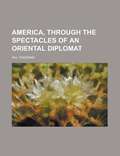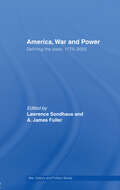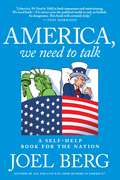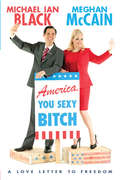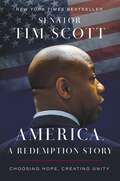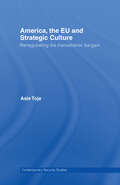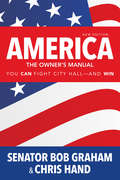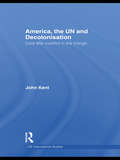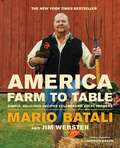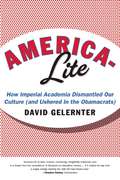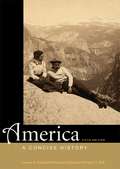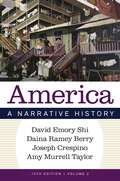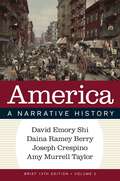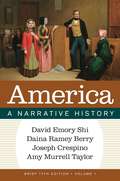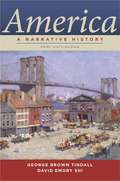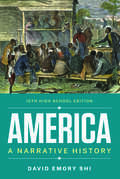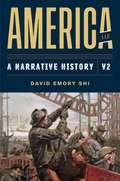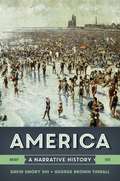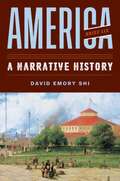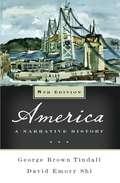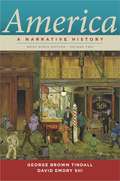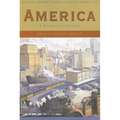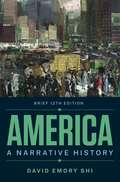- Table View
- List View
America, Through the Spectacles of an Oriental Diplomat
by Tingfang WuAmerica has performed great service for the Orient and especially for China. If, however, the people of the latter country were asked to express their candid opinion on the matter, the verdict would not be altogether pleasant, but would be given with mixed feelings of gratitude and regret.
America, War and Power: Defining the State, 1775-2005 (War, History and Politics)
by Lawrence Sondhaus A. James FullerWritten by leading historians and political scientists, this collection of essays offers a broad and comprehensive coverage of the role of war in American history. Addressing the role of the armed force, and attitudes towards it, in shaping and defining the United States, the first four chapters reflect the perspectives of historians on this central question, from the time of the American Revolution to the US wars in Vietnam and Iraq. Chapters five and six offer the views of political scientists on the topic, one in light of the global systems theory, the other from the perspective of domestic opinion and governance. The concluding essay is written by historians Fred Anderson and Andrew Cayton, whose co-authored book The Dominion of War: Empire and Liberty in North America, 1500-2000 provided the common reading for the symposium which produced these essays. America, War and Power will be of much interest to students and scholars of US military history, US politics and military history and strategy in general.
America, We Need to Talk
by Joel BergThe newest book by Joel Berg--an internationally recognized leader and media spokesman in the fields of hunger, poverty, food systems, and U.S. politics, and the director of Hunger Free America--America We Need to Talk: A Self-Help Book for the Nation is both a parody of relationship and self-help books and a serious analysis of the nation's political and economic dysfunction. Explaining that the most serious--and most broken--relationship is the one between us, as Americans, and our nation, the book explains how, no matter who becomes our next president, average Joes can channel their anger at our hobbled system into concrete actions that will fix our democracy, rebuild our middle class, and restore our stature in the world as a beacon of freedom and hope. Starting with the belief that it's irresponsible for Americans to blame the nation's problems solely on "the politicians" or "the system," Joel makes a case for how it's the personal responsibility of every resident of this country to fix it. The American people are in a relationship with their government and their society, and, as in all relationships, it's the responsibility of both sides to recognize and repair their problems.
America, You Sexy Bitch: A Love Letter to Freedom
by Michael Black Meghan MccainIn the summer of 2011, McCain and Black embarked on a balls-out, cross-country tour. Along the way, they spoke to politicians, gun lovers, abortion-rights advocates and opponents, gay parents, flag burners, Muslims, poker players, Tea Partiers, Minutemen, veterans, teen moms, bikers, fast food workers, and a hooker or two. They toured the White House. They fired semiautomatic weapons. They stopped and ate at every Olive Garden along the way. But mostly they talked to each other about their differences, their similarities. It’s Chelsea Handler meets Hunter S. Thompson in a political cannonball run across America.
America, a Redemption Story: Choosing Hope, Creating Unity
by Senator Tim ScottThe American Dream isn&’t a thing of the past, but a miracle of the present.Now more than ever it&’s easy to focus on the divisions that plague our nation. It may seem as if our best days are behind us, but bestselling author and senator Tim Scott believes we have yet to realize the fullness of our identity. We are in the midst of a story that&’s still unfolding. And beautiful opportunities await.In this powerful memoir, Scott recounts formative events of his life alongside the inspiring stories of other Americans who have risen above hardship and embodied the values that make our nation great. Together these personal and inspirational accounts call readers to embracethe mountaintops as well as the valleys on the journey to a more perfect union;a path marked by optimism, hope, and resolve; anda future characterized by endurance, unity, and strength.Both a clear-eyed reckoning with our nation&’s failures and an ode to its accomplishments, America, a Redemption Story issues a clarion call for all of us to rise courageously to the greatness within our reach.
America, the EU and Strategic Culture: Renegotiating the Transatlantic Bargain (Contemporary Security Studies)
by Asle TojeThis book provides a provocative analysis of relations between Europe and America during the tempestuous years 1998-2004. Analysing EU foreign policy, it concludes that the lessons learnt in interacting with America have been crucial in shaping the emerging EU strategic culture.The book challenges established orthodoxy regarding the sui generis nat
America, the Owner's Manual: You Can Fight City Hall—and Win
by Senator Bob Graham Mr Chris HandIn 2016, Americans fed up with the political process vented that frustration with their votes. Republicans nominated for president a wealthy businessman and former reality show host best known on the campaign trail for his sharp rhetoric against immigration and foreign trade. Democrats nearly selected a self-described socialist who ran on a populist platform against the influence of big money in politics. While it is not surprising that Americans would channel their frustrations into votes for contenders who pledge to end business as usual, the truth is that we don’t have to pin our hopes for greater participation on any one candidate. All of us have a say—if we learn, master and practice the skills of effective citizenship. One of the biggest roadblocks to participation in democracy is the perception that privileged citizens and special interests command the levers of power and that everyday Americans can’t fight City Hall. That perception is undoubtedly why a 2015 Pew Charitable Trusts survey found that 74 percent of those Americans surveyed believed that most elected officials didn't care what people like them thought. Graham and Hand intend to change that conventional wisdom by showing citizens how to flex their citizenship muscles. They describe effective citizenship skills and provide tips from civic experts. Even more importantly, they offer numerous examples of everyday Americans who have used their skills to make democracy respond. The reader will see themselves in these examples of citizens who chose to be victorious participants rather than tranquil spectators in the arena of democracy. By the end of the book, you will have new confidence that citizen participation is the lifeblood of America -- and will be ready to make governments work for you, not the other way around.
America, the Owner's Manual: You Can Fight City Hall—and Win
by Senator Bob Graham Mr Chris HandIn 2016, Americans fed up with the political process vented that frustration with their votes. Republicans nominated for president a wealthy businessman and former reality show host best known on the campaign trail for his sharp rhetoric against immigration and foreign trade. Democrats nearly selected a self-described socialist who ran on a populist platform against the influence of big money in politics. While it is not surprising that Americans would channel their frustrations into votes for contenders who pledge to end business as usual, the truth is that we don’t have to pin our hopes for greater participation on any one candidate. All of us have a say—if we learn, master and practice the skills of effective citizenship. One of the biggest roadblocks to participation in democracy is the perception that privileged citizens and special interests command the levers of power and that everyday Americans can’t fight City Hall. That perception is undoubtedly why a 2015 Pew Charitable Trusts survey found that 74 percent of those Americans surveyed believed that most elected officials didn't care what people like them thought. Graham and Hand intend to change that conventional wisdom by showing citizens how to flex their citizenship muscles. They describe effective citizenship skills and provide tips from civic experts. Even more importantly, they offer numerous examples of everyday Americans who have used their skills to make democracy respond. The reader will see themselves in these examples of citizens who chose to be victorious participants rather than tranquil spectators in the arena of democracy. By the end of the book, you will have new confidence that citizen participation is the lifeblood of America -- and will be ready to make governments work for you, not the other way around.
America, the UN and Decolonisation: Cold War Conflict in the Congo (LSE International Studies Series)
by John KentThis book examines the role of the UN in conflict resolution in Africa in the 1960s and its relation to the Cold War. Focussing on the Congo, this book shows how the preservation of the existing economic and social order in the Congo was a key element in the decolonisation process and the fighting of the Cold War. It links the international aspects of British, Belgian, Angolan and Central African Federation involvement with the roles of the US and UN in order to understand how supplies to and profits from the Congo were producing growing African problems. This large Central African country played a vital, if not fully understood role, in the Cold War and proved to be a fascinating example of complex African problems of decolonisation interacting with international forces, in ways that revealed a great deal about the problems inherent in colonialism and its end. This book will be of much interest to students of US foreign policy, the UN, Cold War history and international history in general.
America--Farm to Table: Simple, Delicious Recipes Celebrating Local Farmers
by Mario Batali Jim WebsterBestselling author and world-renown chef Mario Batali pays homage to the American farmer-from Maine to Los Angeles-in stories, photos, and recipes.AMERICA -- FARM TO TABLE: Simple, Delicious Recipes Celebrating Local FarmersMario Batali, who knows the importance of ingredients to any amazing dish, sees farmers as the rock stars of the food world. In this new book he celebrates American farmers: their high quality products and their culture defined by hard work, integrity, and pride. Batali asked his chef friends from Nashville, Tennessee, to San Francisco, to tell him who their favorite farmers were, and those farmers graciously shared their personal stories along with their top-of-the-line produce and products. In Seattle, Chef Matt Dillon introduces readers to Farmer Pierre Monnat, who produces fava beans and lamb. Batali then features those ingredients in such mouth-watering recipes as: Lamb Shank Sloppy Joes and Fava Bean Guacamole. In Washington, DC, Chef Jose Andres from Jaleo introduces us to Farmer Jim Crawford, who grows corn, broccoli, and strawberries Batali's accompanying dishes include: Chilled Sweet Corn Soup and Grilled Salmon with Strawberry Salsa. Other stops along the way include: Tampa; Austin; Nashville; Las Vegas; Los Angeles; New York, San Francisco; Portland, Maine; Chicago; Cleveland; Suttons Bay, Michigan; and Vail, Colorado. With over 100 superb recipes, this is the book that every home cook will want upon returning from the farmer's market or grocers.
America-Lite
by David GelernterAmerica-Lite (where we all live) is just like America, only turned into an amusement park or a video game or a supersized Pinkberry, where the past and future are blank and there is only a big NOW. How did we come to expect no virtue and so much cynicism from our culture, our leaders--and each other?In this refreshingly judgmental book, David Gelernter connects the historical dots to reveal a stealth revolution carried out by post-religious globalist intellectuals who, by and large, "can't run their own universities or scholarly fields, but are very sure they can run you." These imperial academics have deployed their students into the top echelon of professions once monopolized by staid and steady WASPs. In this simple way, they have installed themselves as the new designated drivers of American culture.Imperial academics live in a world of theory; they preach disdain for mere facts and for old-fashioned fact-based judgments like true or false. Schoolchildren are routinely taught theories about history instead of actual history--they learn, for example, that all nations are equally nice except for America, which is nearly always nasty.With academic experts to do our thinking for us, we've politely shut up and let second-raters take the wheel. In fact, we have handed the keys to the star pupil and teacher's pet of the post-religious globalist intellectuals, whose election to the presidency of the United States constituted the ultimate global group hug.How do we finally face the truth and get back into the driver's seat? America-Lite ends with a one-point plan.
America: A Concise History (Fifth Edition)
by James A. Henretta Rebecca Edwards Robert O. SelfWith fresh interpretations from two new authors, wholly reconceived themes, and a wealth of cutting-edge scholarship, the Fifth Edition of America: A Concise History is designed to work perfectly with the way you teach the survey today. Building on the book's hallmark strengths -- balance, explanatory power, and a brief-yet-comprehensive narrative -- as well as its outstanding full-color visuals and built-in primary sources, authors James Henretta, Rebecca Edwards, and Robert Self have shaped America into the ideal brief book for the modern survey course, at a value that can't be beat.
America: A Narrative History
by David E. Shi Daina Ramey Berry Joe Crespino Amy Murrell TaylorA best-selling narrative history enters a new generation The beloved and best-selling America: A Narrative History family of books has been used by millions of students because of its enthralling storytelling that brings history to life. Award-winning teachers and scholars Daina Ramey Berry (University of California, Santa Barbara), Joseph Crespino (Emory University), and Amy Murrell Taylor (University of Kentucky) join lead author David Shi (Furman University) to enhance the balanced narrative with a focus on the diverse experiences of women in American history. Seamlessly integrated into the reading experience, new tools help students to read at the college level and engage with the building blocks of history: primary sources.
America: A Narrative History
by David E. Shi Daina Ramey Berry Joe Crespino Amy Murrell TaylorA best-selling narrative history enters a new generation The beloved and best-selling America: A Narrative History family of books has been used by millions of students because of its enthralling storytelling that brings history to life. Award-winning teachers and scholars Daina Ramey Berry (University of California, Santa Barbara), Joseph Crespino (Emory University), and Amy Murrell Taylor (University of Kentucky) join lead author David Shi (Furman University) to enhance the balanced narrative with a focus on the diverse experiences of women in American history. Seamlessly integrated into the reading experience, new tools help students to read at the college level and engage with the building blocks of history: primary sources.
America: A Narrative History
by David E. Shi Daina Ramey Berry Joe Crespino Amy Murrell TaylorA best-selling narrative history enters a new generation The beloved and best-selling America: A Narrative History family of books has been used by millions of students because of its enthralling storytelling that brings history to life. Award-winning teachers and scholars Daina Ramey Berry (University of California, Santa Barbara), Joseph Crespino (Emory University), and Amy Murrell Taylor (University of Kentucky) join lead author David Shi (Furman University) to enhance the balanced narrative with a focus on the diverse experiences of women in American history. Seamlessly integrated into the reading experience, new tools help students to read at the college level and engage with the building blocks of history: primary sources.
America: A Narrative History
by George Brown Tindall David E. ShiAmerica has sold more than 1. 8 million copies over the past eight editions because it's a book that students enjoy reading. Effective storytelling, colorful anecdotes, and biographical sketches make the narrative absorbing and the material more memorable.
America: A Narrative History
by David E. ShiThe best-selling storytelling approach with tools that develop history skills. <p><p> America: A Narrative History High School Edition puts narrative front and center with David Shi’s rich storytelling style, colorful biographical sketches, and vivid first-person quotations. The new editions further reflect the state of our history and society by continuing to incorporate diverse voices into the narrative with new coverage of the Latino/a experience as well as enhanced coverage of gender, African American, Native American, immigration, and LGBTQ history. <p><p>With dynamic digital tools, including the InQuizitive adaptive learning tool, and new digital activities focused on primary and secondary sources, America: A Narrative History gives students regular opportunities to engage with the story and build critical history skills.
America: A Narrative History
by David Emory ShiAmerica is the leading narrative history because students love to read it. Additional coverage of immigration enhances the timeliness of the narrative. New Chapter Opener videos, History Skills Tutorials, and Norton's adaptive learning tool, InQuizitive, help students develop history skills, engage with the reading, and come to class prepared. What hasn't changed? Our unmatched affordability.
America: A Narrative History
by David Emory Shi George Brown TindallThis book seeks to improve upon a textbook grounded in a compelling narrative history of the American experience. An engaging book focused on political and economic developments but animated by colorful characters, informed by balanced analysis and social texture, and guided by the unfolding of key events. Those classic principles, combined with a handy format and low price, have helped make the book one of the most popular and well-respected American history textbooks. This Tenth Brief Edition of America features a number of important changes designed to make the text more teachable and classroom-friendly. Chief among them are major structural changes, including the joining of several chapters to reduce the overall number from thirty-four to thirty-two as well as the resequencing of several chapters to make the narrative flow more smoothly for students.
America: A Narrative History
by David Emory ShiAmerica is the leading narrative history because students love to read it. Additional coverage of immigration enhances the timeliness of the narrative. New Chapter Opener videos, History Skills Tutorials, and Norton’s adaptive learning tool, InQuizitive, help students develop history skills, engage with the reading, and come to class prepared. What hasn’t changed? Our unmatched affordability. Choose from Full, Brief (15% shorter), or The Essential Learning Edition--featuring fewer chapters and additional pedagogy.
America: A Narrative History
by George Tindall David ShiAmerica: A Narrative History, Tenth Edition
America: A Narrative History (8th Edition)
by David Emory Shi George Brown TindallA book students will read. The narrative wins students over with compelling storytelling, colorful anecdotes and biographical sketches that make the material more memorable. The text includes helpful in-text study aids, and a host of electronic media resources to help teachers teach and students learn. FEATURES Storytelling makes the material memorable An absorbing narrative wins students over, and includes colorful anecdotes and biographical sketches. A consistent narrative voice provides a clear path through the complexities of American history, with significant attention to social, cultural, economic, and political history. The compact trim size makes the book highly portable and readable, and the book's design supports the readability of the narrative-there are no boxes, inserts or pull-outs to interrupt the flow of the story. New pedagogy highlights core content Carefully crafted pedagogical features have been added to guide students through the narrative. Focus questions and chapter summaries work together seamlessly to highlight the core content that students need to know. Other in-text features include chapter chronologies and lists of key terms. New compelling theme on religion The Eighth Edition explores the role that religion has played in our everyday lives, our culture, and our politics throughout America history. David Shi highlights the effect of religion as a motivating force behind the settlement of the America, discusses its effects on the formation of the country, explores the influence of evangelical ideas and methods on social movements, looks at the role of religion during times of warfare, and analyzes the relationship between religion and state policy. The Norton Digital History Archive includes a new DVD on religion to support this compelling new theme in the text. Innovative emedia helps students learn and teachers teach The free student website provides a proven, assignment-driven plan for each chapter, and includes a wealth of study and review materials, including new interactive map quizzes, and American History Map Tours using Google Earth mapping technology to reinforce the relationship between geography and history. Resources for instructors include an Instructors Resource Disk, with PowerPoint lecture outlines and figures from the text, the Norton Digital History Archive (a seven DVD set with a new disc on religion), free coursepacks (using Blackboard, WebCT and other course management systems), an Instructors Manual, and a revamped Test Bank. The best companion primary source reader For The Record, Fourth Edition, by David Shi and Holly Mayer, serves as the perfect companion reader for America, Eighth Edition. For the Record includes a rich collection of 225 primary sources, both textual and visual, with just the right amount of pedagogy. The Fourth Edition includes a number of documents designed to highlight the new religion theme in the main text.
America: A Narrative History (Brief Ninth Edition) (Vol #2)
by George Brown Tindall David E. ShiAmerica has sold more than 1. 8 million copies over the past eight editions because it's a book that students enjoy reading. Effective storytelling, colorful anecdotes, and biographical sketches make the narrative absorbing and the material more memorable. The Brief Ninth Edition is 20% shorter, and includes refreshed and updated coverage of African American history, and has been streamlined from 37 to 34 chapters.
America: A Narrative History (Brief Seventh Edition)
by George Tindall David Emory ShiAmerica's political, social, cultural and environmental history.
America: A Narrative History (Brief Twelfth Edition) (Vol. Combined Volume)
by David E. ShiThe best-selling storytelling approach with tools that develop history skills America: A Narrative History puts narrative front and center with David Shi’s rich storytelling style, colorful biographical sketches, and vivid first-person quotations. The new editions further reflect the state of our history and society by continuing to incorporate diverse voices into the narrative with new coverage of the Latino/a experience as well as enhanced coverage of gender, African American, Native American, immigration, and LGBTQ history. With dynamic digital tools, including the InQuizitive adaptive learning tool, and new digital activities focused on primary and secondary sources, America: A Narrative History gives students regular opportunities to engage with the story and build critical history skills. This purchase offers access to the digital ebook only.
